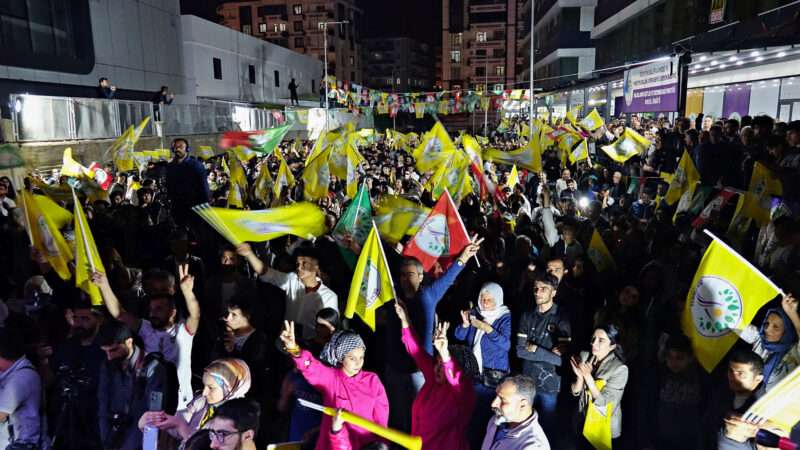
When the law fails to stop the ruling party from cheating, protests work. That's the lesson Kurds in the city of Van, Turkey, learned during their local election this week.
The dispute between the ruling Justice and Development Party (AKP) and opposition Peoples' Equality and Democracy Party (DEM) was the classic picture of strongman election tactics. And the local reaction showed what it looks like for people to successfully fight back.
Just before polls opened, authorities disqualified DEM candidate Abdullah Zeydan, because he had been convicted of terrorist propaganda for attending the funeral of Syrian Kurdish rebels. (Turkey considers most Kurdish rebels to be terrorists.) By mooting all the votes for the DEM, the government handed the election to an AKP flunkie who only won 27 percent of the vote.
The reaction from the streets was immediate and intense. The Financial Times reported that the unrest in Van sounded "exactly like a war here." After days of mass protests, Turkey's national election board reinstated Zeydan as the winner on Wednesday.
It wasn't the first time that Turkish authorities tried to overturn the will of Kurdish voters. Over the past decade, the Turkish government appointed dozens of unelected "trustee mayors" in Kurdish-majority towns, claiming that the elected mayors were linked to terrorism. DEM itself was founded after authorities shut down the previous Kurdish-led party on terrorism charges.
But it may be the first time that protests managed to reverse the government's decision. The reaction from the street was immediately, and DEM found allies outside of Kurdish areas. Turkey's largest opposition faction, the liberal Republican People's Party (CHP), joined in denouncing the government's "completely lawless" move.
"In previous instances, the [non-Kurdish] opposition was not as vocal in terms of criticizing the government," says Gonul Tol, director of the Turkey program at the Middle East Institute, a nonprofit research center in Washington, D.C. "The opposition [now] understands that the Kurdish vote is important, and they're running on a platform of restoring Turkish democracy."
Even though it gave some ground on the election, the Turkish government also took the opportunity to round up opponents. Turkey's Interior Minister Ali Yerlikaya announced that authorities had arrested 340 people in Van and at solidarity rallies across the country for "illegal street protests on behalf of the Separatist Terrorist Organization," using a catch-all term for Kurdish rebels.
"I want our dear nation to know that we will not tolerate any acts of terrorism," Yerlikaya said in a statement. "I congratulate our heroic police officers who carried out the operations."
All across Turkey, the AKP took a beating in last weekend's local elections, both from ethnically Turkish and Kurdish candidates. DEM won most provinces in the Kurdish-majority southeast of the country—even after the AKP allegedly used ballot stuffing and voter intimidation to nudge the results in its direction.
"Not all autocracies are created equal," Tol says. "Elections in Turkey are not like elections in Russia. They are actually competitive in that there is a really strong voter commitment to the electoral process."
In Bitlis, a Kurdish-majority city in southeastern Turkey, DEM demanded a recount because the government had invalided 2,013 votes in an election that the AKP won by only 198 votes. DEM's request for a recount was denied.
"We are not just competing against a political party," Ceylan Akca, a DEM member of parliament for Diyarbakir who was in Bitlis for election work,* tells Reason. "We are competing against a political party that has become the state itself."
She compares DEM's experience to a homeowner who finds a burglar in her house, calls the police, and gets arrested instead of the burglar.
Elsewhere, the nonprofit Human Rights Association accused the AKP of buying 1,200 votes for €57,000 ($61,776) in four villages. In the city of Siirt, supporters of the AKP and the rival Democracy and Progress Party (DEVA) rioted against each other. The brother of the DEVA candidate was reportedly shot dead.
In Batman, another predominantly Kurdish city where DEM won the election, police cracked down on DEM's victory party. Soon after, Turkish Air Force fighter jets buzzed around the city. DEM claimed that the jets were an attempt to intimidate Kurdish voters.
Akca says that Americans should be especially concerned with the Batman incident because Turkey's combat aircraft all come from the United States, which continues to provide maintenance and upgrades. The U.S. Department of State did not respond to a request for comment.
DEM also accused the AKP of ballot stuffing through army deployments. Under Turkish law, soldiers can vote where they are deployed, even in local elections. Videos showed uniformed soldiers being brought to the polls en masse in Kurdish towns. Mehmet Zeki Irmez, the DEM member of parliament in Sirnak, called them "mobile voters."
The office of President Recep Tayyip Erdogan did not deny that the government was bussing soldiers to the polls, and claimed that the troops needed to be transported "collectively in order to prevent any security breach."
While the reaction in Van showed that Erdogan responds to public pressure, "it doesn't mean that the Kurdish win is secure," Tol says. "Maybe he's just waiting for things to calm down."
* CORRECTION: This article initially misstated which city Akca represents in parliament.
The post Kurdish Protesters Managed To Stop Election Cheating in Turkey appeared first on Reason.com.







